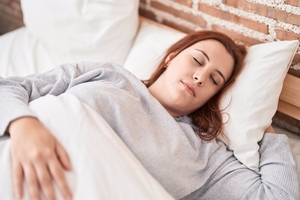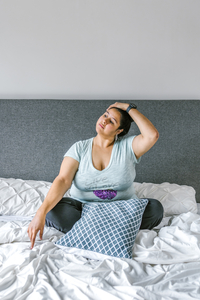Can I treat sleep disorders without medication?
Sleep Disorder Treatments
Sleep-wake disorders can be overwhelming, make life more difficult, and interfere with your health, but sleep disorder treatments can often effectively relieve symptoms or manage or even cure the condition. You may need medications, but an inability to sleep does not always require medication. Often, sleeping problems can go away or become much less severe when you make simple changes.
Medicine for Sleep Disorders
There are many medications for sleep disorders. A doctor may prescribe them based on your particular symptoms and diagnosis. These are some common sleeping pills.
- Melatonin (also available over the counter) to induce sleep and help you stay asleep.
- Benzodiazepine and non-benzodiazepine hypnotics for parasomnia and insomnia.
- Orexin receptor antagonists to counter the wakening effect of the chemical orexin.
- Anti-narcoleptics to increase daytime wakefulness.
Over-the-counter medications are also commonly used. They also can have side effects, interactions with other medications that you take, or a risk of dependency, so it is best to ask your doctor before taking them.
Better Sleep Hygiene
Sleep hygiene refers to sleep habits. Good sleep hygiene can help you fall asleep faster and stay asleep, as well as get better quality sleep. The CDC offers several tips to achieve or maintain good sleep hygiene.
- Stick to a consistent bedtime and waking time, including on weekends.
- Try to get enough sleep during the week so you can avoid sleeping in on weekends.
- Keep your room cool.
- Sleep in a dark, quiet room.
- Use your bed only for sleeping and sex, and not for other activities such as watching TV or reading.
- Avoid electronic devices within 30 minutes of bedtime. This includes phones, televisions, and computers.
A health coaching app, such as Lark, can help you with sleep hygiene by tracking your sleep patterns and reminding you of healthy sleep behaviors.
Healthier Lifestyle Choices
Your lifestyle choices can greatly affect your sleep quality and quantity, too. In general, choices that are good for overall health are also good for sleep.
- Diets higher in healthy foods, such as fish, vegetables, and high-fiber foods, have been linked to better sleep quality.
- Diets higher in saturated fat, low-fiber carbohydrates, and sugary foods and beverages have been linked to poorer sleep quality.
- Regular exercise, but not too close to bedtime, can improve sleep.
- Avoid caffeine within 6 hours of bedtime. Sources include coffee, green and black tea, chocolate, some soft drinks, and some energy and sports drinks.
- Avoid a large meal or alcohol right before bedtime.
- Losing weight if you are obese is a good way to lower risk for obstructive sleep apnea, or manage it if you have it.
The Best Sleep App
The best sleep app supports you in achieving the healthiest sleep you can. It encourages you to adapt healthy sleep behaviors as well as to follow any doctor's orders that you have for improving sleep. Lark is an app that supports a comprehensive healthy lifestyle that includes smart sleep habits.
The app should monitor and track sleep, providing you with the chance to see your sleep history over recent weeks, as well as pointing out certain patterns. This increases your awareness of your sleep habits. You might, for example, notice how short you are on sleep during the week and therefore you might start to try to get to bed earlier each night. You might discover patterns for times when you feel tired during the day or have trouble falling asleep at night.
The best sleep app does not just track sleep. It also coaches you on improving your sleep. Lark Health Coach, for example, offers advice for getting better sleep on a consistent basis. Your coach reminds you that you are worth it – so getting enough sleep is worth it. And for those times when you just need a sympathetic ear, Lark has empathy for you to help you feel better and get through the day.
Be good to yourself, and get enough sleep. Work through any sleep disorders as much as you can, and get the help you need, whether from a doctor or from a health app. The payoff can be well worth it.












.webp)




.jpg)

